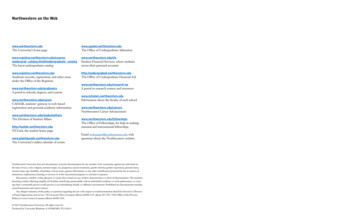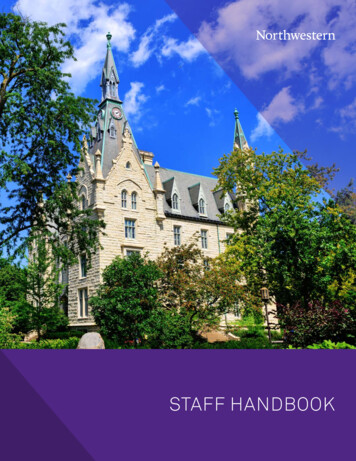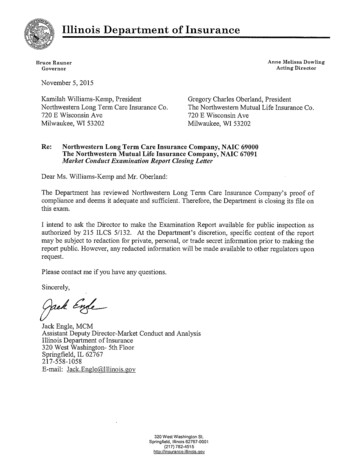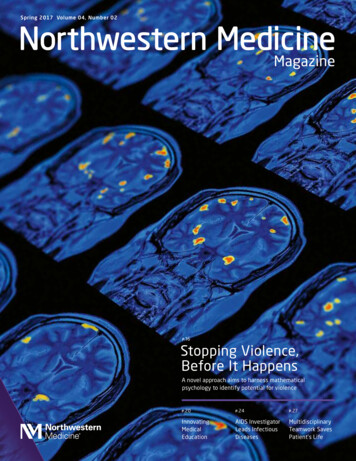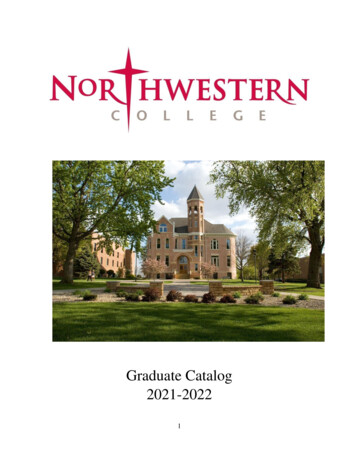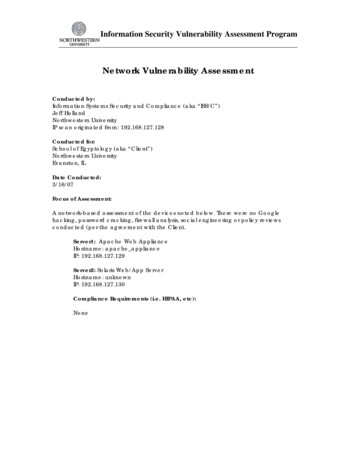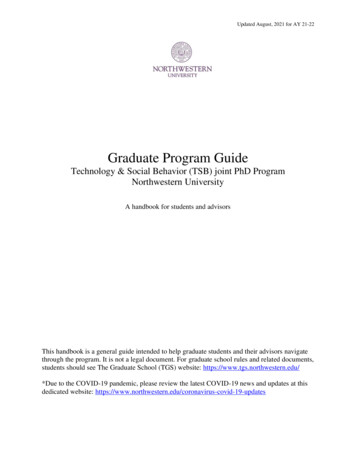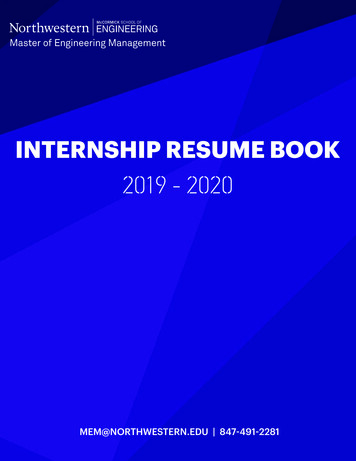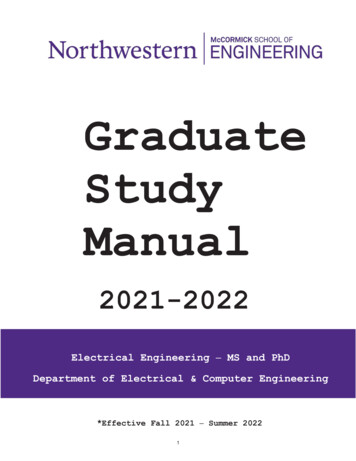
Transcription
GraduateStudyManual2021-2022Electrical Engineering – MS and PhDDepartment of Electrical & Computer Engineering*Effective Fall 2021 – Summer 20221
TABLE OF CONTENTSWelcome . 41. Overview. 51.1General Notes . 51.2General Admission Requirements . 81.3Financial Aid . 81.4Student Responsibilities and Academic Misconduct . 91.5Graduate Internships & Post-Graduation Employment. 92. MS Program . 112.1MS Degree Options . 112.2Advising and Course Requirements . 132.2.1TGS Degree Requirements . 152.2.2Enrollment Options to Maintain Resident Student Status . 152.3Degree Completion . 152.4Transfer to a different MS program . 162.5Part-time Graduate Program . 172.6Pursuing a PhD After Being Admitted to the MS Program . 172.7Probation, Exclusion, and Appeal Processes . 172
3 PhD Program . 183.13.2Milestones . 183.1.a Selection of a PhD Adviser . 183.1.b Admission to Candidacy . 183.1.c Qualifying Examination . 193.1.d Prospectus (Dissertation Proposal) . 193.1.e Teaching Requirement . 20Registration and Course Requirements . 203.2.a The Graduate School Requirements . 203.2.b Common ECE Course Requirements . 213.2.c Programs of Study . 213.2.d Petitioning for Course Credit or Substitution . 213.2.e Internships during Graduate Study: The Crown Family Graduate Internship. 223.3Probation, Exclusion, and Appeal Processes . 224Doctoral Programs of Study (PS) . 244.1Solid-State, Photonic and Quantum Technologies (ElectricalEngineering). 254.2Signals & Systems (Electrical Engineering) . 313
WelcomeAs the Director of Graduate Studies (DGS) of the Department of Electrical and ComputerEngineering (ECE) in Northwestern University’s McCormick School of Engineering andApplied Science, it gives me great pleasure to welcome you. I wish you very successfuland pleasant years at Northwestern University.Sincerely,Randy Freeman, ProfessorDirector of Graduate StudiesECE DepartmentEmail: freeman@northwestern.edu4
1. OverviewThis manual provides detailed information about the educational opportunities in our graduate programs inelectrical engineering. It includes descriptions of our curricula, suggestions for coursework, various options, andinformation about our faculty, computer facilities, and student activities.The document is in full compliance with the guidelines provided by The Graduate School (TGS) and often refersto sources available through their website.1.1General NotesIn addition to the world-class educational opportunities to work with top faculty while accessing a wealth offacilities, research labs, and libraries for intellectual growth, Northwestern University offers a variety of serviceswhich can assist different aspect of student life.Wildcard:The Wildcard is your photo identification card and can be used in almost every place that needs an identityverification on campus (library, recreational facilities, Norris University Center, campus, intercampus bus transit,etc.). It is issued by the Wildcard office in Norris University Center, underground level, Evanston campus, and atthe University Services (support services) office in Abbott Hall, Room 100, Chicago campus. Lost or stolen IDcards are replaced for a 15 fee. Broken or damaged cards will be replaced at no charge (providing the damagedcard is returned).Transportation:There are three basic services available: Shuttle buses – there are several shuttles that operate on the Chicago and Evanston campuses (and betweenthe two) upon presentation of a Wildcard. Detailed information is available ation/shuttles/ The Route 201 CTA bus which offers free service to Ryan field and to the Old Orchard mall in Skokieupon presentation of a Wildcard. U-Pass -- U-Pass is a collaboration between Northwestern and CTA (Chicago Transit Authority) based onfare cards called Ventra, a contactless payment system that serves as a U-Pass. The card is issued at thebeginning of every academic year, and it can be used 365 days a year on all CTA buses and trains providedthat students are registered full-time.Health Services:Northwestern University provides basic outpatient care and other primary-care services, and there are facilities inboth Evanston and Chicago campuses. The Evanston location is at 633 Emerson Street (Searle Building). PerTGS regulations, every graduate student is legally required to have health insurance coverage. While it isprovided for PhD students and a partial coverage is available for MS students, students may opt out of thiscoverage as long as there is a proof of alternate coverage for the entire duration of graduate studies.Counseling and Psychological Services (CAPS): (847-491-2151)CAPS provides a set of core mental health services on campus, including clinical services, educationalworkshops, and consultation with faculty and staff as needed. Services are free for all students and available onboth the Evanston (633 Emerson St) and Chicago campuses (Abbott Hall, 5th Floor, Suite 500, #710 N. LakeShore Drive)https://www.northwestern.edu/counseling/5
Personal Safety:You should always be aware of your surroundings and avoid areas that have indication of being a potentiallynon-safe environment (e.g., poorly lit walkways and alleys at night). The University Policy is on duty 24/7 andthey are located at 1200 Davis St. in Evanston. In the case of emergency, always dial 911. Note that there areblue-light poles distributed across the University, which can also be used to contact the University police. Thenon-emergency contact number is 847-491-3456.The Office of International Student and Scholar Services (OISS):The OISS is available to all the international students and its primary two roles are: (a) to provideguidance/advise for maintaining proper immigration status consistent with the laws of the United States; (b) toensure compliance with those laws and help the students with various forms, such as OPT (Optional PracticalTraining) and CPT (Curriculum Practical Training). The OISS is located at 630 Dartmouth place and the regularhours of operations are M-F, 10AM-5PM.The Graduate School (TGS) – other resources and informationEvery graduate student is assigned a counselor at TGS. The counselor monitors overall academic progress fromthe standpoint of TGS-based milestones, along with a satisfactory GPA, etc. Please be advised that most of theforms that concern completion of milestones are subject to a final approval by TGS in addition to being approvedby your academic adviser and/or ECE department.TGS is located at 633 Clark Street in Evanston, and its webpage: www.tgs.northwestern.edu contains a wealth ofinformation pertaining to various aspects of students’ life, some of which were described in the concise mannerin this sub-section.ECE Departmental ResourcesGraduate students are expected to discuss all academic issues with their advisers first, in an open andconstructive manner. Further help with academic issues is provided by the ECE Graduate Student AffairsCoordinator (Tech, Room L-357 – k-sudman@northwestern.edu). The staff in the Graduate Office isexperienced and can advise you on the course of action and promptly take the measures needed towardssuccessful completion of your degree. Mailboxes maintained by the staff are provided for all graduate studentsfor university-related postal mail and packages only (not for personal use) and are located in the ECE GraduateStudent Affairs Office. Each student is expected to show their Wildcard upon pickup, and may only pick up theirown mail, not that of another student. It should be made a matter of a habit to check for such mail at least once amonth.Our mailing address is:Department of Electrical and Computer EngineeringMcCormick School of Engineering2145 Sheridan Road, Rm L357Evanston, IL 60208The information about our courses is available al-computer/courses/Graduate students should make it a habit of checking the above webpage when planning the courses to be takenin the subsequent quarters, and then proceed with a discussion with the respective academic advisers (andpopulating the data in the Graduate Student Tracking System (GSTS)).Other useful information (e.g., forms, job posting, announcements of visits by companies/recruiters, etc.) can befound at: computer/ECE organizes various social events throughout the Academic Year for which announcements via email aremade regularly.6
Nondiscrimination Statement:Northwestern University does not discriminate or permit discrimination by any member of its community againstany individual on the basis of race, color, religion, national origin, sex, pregnancy, sexual orientation, genderidentity, gender expression, parental status, marital status, age, disability, citizenship status, veteran status,genetic information, reproductive health decision making, or any other classification protected by law in mattersof admissions, employment, housing, or services or in the educational programs or activities it operates.Harassment, whether verbal, physical, or visual, that is based on any of these characteristics is a form ofdiscrimination. Further prohibited by law is discrimination against any employee and/or job applicant whochooses to inquire about, discuss, or disclose their own compensation or the compensation of another employeeor applicant.Northwestern University complies with federal and state laws that prohibit discrimination based on the protectedcategories listed above, including Title IX of the Education Amendments of 1972. Title IX requires educationalinstitutions, such as Northwestern, to prohibit discrimination based on sex (including sexual harassment) in theUniversity’s educational programs and activities, including in matters of employment and admissions. Inaddition, Northwestern provides reasonable accommodations to qualified applicants, students, and employeeswith disabilities and to individuals who are pregnant.Any alleged violations of this policy or questions with respect to nondiscrimination or reasonableaccommodations should be directed to Northwestern’s Office of Equity, 1800 Sherman Avenue, Suite 4-500,Evanston, Illinois 60208, 847-467-6165, equity@northwestern.edu.Questions specific to sex discrimination (including sexual misconduct and sexual harassment) should be directedto Northwestern’s Title IX Coordinator in the Office of Equity, 1800 Sherman Avenue, Suite 4-500, Evanston,Illinois 60208, 847-467-6165, TitleIXCoordinator@northwestern.edu.A person may also file a complaint with the Department of Education’s Office for Civil Rights regarding analleged violation of Title IX by visiting html or calling 800421-3481. Inquiries about the application of Title IX to Northwestern may be referred to Northwestern’s Title IXCoordinator, the United States Department of Education’s Assistant Secretary for Civil Rights, or both.7
1.2General Admission RequirementsThe primary objective of the admission process in the ECE Department is to determine an applicant’squalifications and judge the applicant’s prospects for success in their desired program of study. Tomaintain a proper balance between department resources and the size of the graduate studentpopulation, we must limit offers of admission to the most qualified applicants. Thus, our admissionprocess is highly selective and competitive in nature.The deadline for PhD applications is December 15 of the respective year for the applicants who wish tobe admitted to the program starting in the Fall Quarter of the subsequent academic year. The deadlinefor MS applications is typically the last week of February of the year during which an applicant plansto start in the Fall Quarter.Requests for admission and financial aid for doctoral students are reviewed in the weeks following theapplication deadline. It is the policy of the department that students begin their programs in FallQuarter. Under special circumstances, students are allowed to begin in the Winter or Spring Quarter. Atypical applicant is expected to have a B.S. in electrical engineering, computer engineering, or a relateddiscipline from a recognized institution. Highly qualified candidates with other academic backgroundsmay also be considered. The specific undergraduate preparation required for graduate study depends onthe program and the area of specialization. An applicant with insufficient undergraduate preparation inany particular area but well qualified in every other respect may be required to take certainundergraduate courses as soon as possible after enrolling at Northwestern. A student would be informedof such a requirement at the time of admission, along with grade expectations.The Graduate School (TGS) website ml provides ameans to navigate through the application process for graduate study at Northwestern University.1.3Financial AidPhD StudentsThe policy of the McCormick School is to admit only those students for whom financial support canbe provided in the form of Northwestern (e.g. Cabell and Murphy) Fellowships, researchassistantships, and teaching assistantships. Students who have financial support from outsideinstitutions or government grants will also be considered for admission. However, if such internal(McCormick, ECE Department) or external (company, institutional fellowship, government) financialsupport is not provided, then the ECE Department will not recommend admission of the student to TheGraduate School.Terminal MS StudentsThe ECE Department encourages terminal MS students, especially from industry, to apply. However,the Department does not provide financial support to terminal MS students. Such students can besupported by a company, government, or an external fellowship, or be self-supported. MS studentsare not eligible for teaching assistantships or research assistantships.NOTE: MS applicants are only admitted for a Fall Quarter start date. This is to avoid any problems with the coursesequence.18
Student Responsibilities and Academic MisconductIt is the responsibility of each graduate student to ensure that all the requirements of The GraduateSchool (TGS) and the ECE Department are met, given the program he or she selects; that necessaryexaminations are properly scheduled; and that deadlines dependent on current Northwestern Universitycalendars are observed. The current procedures and degree requirements of the ECE Graduate Programsare detailed in this Manual.Students should always consult with the ECE Graduate Student Affairs Coordinator (Tech, L357, k-sudman@northwestern.edu) first to execute procedures, confirm requirements, and obtainpaperwork for exams and various other procedures. In addition, students are strongly urged to consultregularly with their faculty advisers.Official notices about degree program progress, financial aid and other important notices are sent toeach student’s official email and mailboxes.Students are responsible for checking their official Northwestern email account( name @u.northwestern.edu) on a regular basis, no less than once a week.Students are responsible for checking their official department mailbox on a regular basis, no lessthan once per month.All students at Northwestern University are responsible for knowing the University's policies onacademic integrity. The principles and possible consequences of academic misconduct aredocumented cademic-integrity/principles.htmlStudents found guilty of academic misconduct, such as cheating on coursework or plagiarizing research,by definition are failing to make satisfactory academic progress, and hence subject to be placed onacademic s must be particularly vigilant in programming courses. Unless the instructor for the course hasexplicitly documented otherwise in the course syllabus: Code you submit must be your own. Copying and adapting someone else's code is not allowed. Studying someone else's solution for a specific assigned problem is not allowed. This includes code from a friend, an online article, or online code repository. Letting another student study your solution is not allowed.If an instructor concludes that cheating has occurred, he or she will submit the evidence to your dean foradjudication. Penalties for cheating will depend on the specifics of the case. They can range from loss ofpoints on the assignment in question, a reduction in letter grade for the course, or even failure inextreme circumstances.1.4Graduate Internships & Post-Graduation EmploymentA graduate student wishing to combine research work with industrial experience may, with thepermission of their adviser, elect to participate in the Crown Family Graduate Internship Program. Thisexperience permits the student to gain a broader understanding of some problems that eventually couldserve as the background for a thesis or project. For more information on the Crown Family GraduateInternship Program, see Section 3.2.e of this Manual.9
International students who seek employment in the US upon graduating, who are on an F-1 visa, are ingood academic standing, and have a valid I-20 should be aware that the visa status required for legalemployment in the US after graduation is called OPT, and it MUST BE APPLIED FOR 3-4MONTHS BEFORE GRADUATION. Without submitting this application in advance, you will not beable to transition smoothly from the F-1 student status to the OPT visa status, and any such interruptionmay delay or prohibit your employment with a US employer. The Office of International Student andScholar Services (OISS) assists students with collection and submission of the required documents. Inaddition to consulting with your adviser, you should also schedule a meeting at least one month inadvance of the OPT submission deadline to ensure you have enough time to collect the neededdocumentation.10
2. MS ProgramThis section discusses the details of the academic aspects of the process of obtaining MS degree withthe ECE department. Unless otherwise specified, all the items pertain to both EE and CE majors.2.1 MS Degree OptionsEach student pursuing an MS degree in the ECE Department must declare their intention to follow one ofthe degree plans (A, B, or C) summarized below. The student’s declaration is subject to approval by theiradviser. We recommend that this declaration be made during the second (Winter) quarter, but we requirethat it be made no later than May 1st of the third (Spring) academic quarter.Plan A (Thesis MS Degree): In this plan, a student declares their intent to earn the MS degree bycompleting a formal thesis that reports substantial original research results. Under this plan, a maximum ofthree units of ELEC ENG or COMP ENG 590 research credit can be counted toward the 12-unitrequirement for the MS degree. All requirements for the thesis MS, including coursework and approval ofthe thesis by the student’s MS Examination Committee, must be successfully completed before the end ofthe seventh academic quarter (Spring quarter of the second year).Thesis RequirementsA successful thesis has two components: a written document and an oral defense of the research. Theseare judged by a committee, headed by the thesis adviser, who is the committee head. One week prior tothe oral defense, the student must provide a complete draft of the thesis to the committee. The defenseshould take between 30 minutes and 1 hour. Upon a successful defense, the committee will suggest editsto the document, if any are required.The minimum MS thesis committee size is two people: the thesis adviser and one other faculty member.There must be at least 2 ECE faculty members on the thesis committee. They must both be on thegraduate faculty. The thesis adviser must be a primary or affiliated faculty member of the Electrical andComputer Engineering Department. The MS thesis must conform to the formatting guidelines of adoctoral thesis, as specified by the graduate school at the following licies/dissertation-format-guidelines.pdfThere is no specific length for a thesis. Historically, they tend to be roughly 30 pages in the doublespaced graduate school thesis format. This is not a required length. The length must be negotiated withthe thesis committee.IMPORTANT: In Spring term, the Graduate School requires all thesis defenses to be completed ONEMONTH before the end of the quarter if the student is to graduate in the Spring term. Deadlines inother quarters are not as early. Consult the Office of the Registrar’s academic calendar for thesisdefense deadlines for each quarter.Plan B (Project MS Degree): In this plan, a student declares their intent to earn the MS degree bycompleting a project and writing a project report that contains results based on existing theory andtechniques or experimental verifications. A maximum of two units of ELEC ENG or COMP ENG 590research credit can be counted toward the 12-unit requirement for the MS degree. All requirements for theproject MS, including all coursework and approval of the project report by the student’s MS ExaminationCommittee, must be successfully completed before the end of the sixth academic quarter (Winter quarter ofthe second year).11
Project RequirementsA project requires a written final document, approved by an examination committee.The minimum committee size is 2: the adviser and one other faculty member. There must be at least 2ECE faculty members on the thesis committee. They must both be on the graduate faculty. The projectadviser must be a primary or affiliated faculty member of the Electrical and Computer EngineeringDepartment.Format of project document: It is recommended (but not required) that the project document conform tothe formatting guidelines of a doctoral thesis, as specified by the graduate school at the following licies/dissertation-format-guidelines.pdfLength of project document: There is no specific length for a project document. The length must benegotiated with the committee.Once the adviser approves the final project document, submitting the project as an ECE technicalreport is not required.Plan C (Course MS Degree): In this plan, the student must satisfactorily complete 12 coursesapproved by the student’s adviser. The choice of courses must represent a coherent program of study thatprepares the student for advanced work in a specific field. All requirements for the course M.S degree mustbe satisfactorily completed before the end of the fifth academic quarter (Fall quarter of the second year).Note that ELEC ENG 590 and COMP ENG 590 cannot be counted as a credit for a course-only based MSdegree. The purpose of ELEC ENG 590 and COMP ENG 590 is to get students involved in researchbeyond the traditional course experiences. Hence, ELEC ENG 590 and COMP ENG 590 can only beapplied towards the MS project option or the MS thesis option.Time Limits: An MS student who does not meet the plan’s completion deadline, and who does notsuccessfully petition the ECE Department for an extension of that deadline, will be placed on academicprobation for a maximum of two academic quarters. At that point, the Department retains the option todismiss the student in question.12
2.2 Advising and Course RequirementsAdvisingEach MS student is assigned an academic adviser upon admission. However, the student’s preferencesand interests may change, especially if they elect to follow the project or thesis degree plan, whichtypically entails the completion of one or more ELEC ENG 590 or COMP ENG 590 research units.This may require the student’s transition to a new adviser. Such a transition involves the followingsteps: (1) The student notifies the current assigned adviser; (2) The ECE Graduate Student AffairsCoordinator records the adviser change in the Graduate Student Tracking System (GSTS).Each MS student must consult with their adviser before registering online for courses on CAESAR.Failure to do so could result in poor course selection that would delay completion of the student’s MSdegree, or even result in academic probation due to poor grades.Course requirementsTypically, one unit of credit equals one course.Twelve (12) units of graduate-level credits are required for any ECE MS degree.All of the 12 units must be at the 300-level or above and must count for graduate coursework.Six (6) of the 12 units must be Electrical Engineering courses. This includes all courses above 300 with the ELEC ENG prefix, with two exceptions. ELEC ENG 499 (Independent Study) and ELEC ENG 590 (Research) do not count asElectrical Engineering coursework. COMP ENG 303 (Advanced Digital Design) and COMP ENG 391 (CMOS VLSI CircuitDesign) are counted as Electrical Engineering courses.Three (3) of the 12 units must be at the 400-level or above. ELEC ENG 590 research units do not count towards 400-level course credits. ELEC ENG 499 does count towards the 400-level course requirement.Up to three (3) of the 12 units can be from graduate coursework outside ECE or CSHowever, courses outside of ECE or CS must be approved by the student’s adviser and the Director ofthe MS Program in EE. The courses must be related to the student's program of study. These units canapply to either the requirement for 300-level or 400-level courses. It is important to consult with theacademic adviser prior to enrolling in any course outside ECE or CS.Master’s students engaged in research should enroll in either 499 or 590. Those wishing to be graded and those pursuing a course-based degree should enroll inELEC ENG 499: Independent Study. Those wishing to pursue research without affecting their grade point average should enroll inELEC ENG 590: Thesis Research. 499 and 590 may each be taken for a maximum of 3 units.Establishing Background: All MS Students in Electrical Engineering (including BS/MS students)must provide evidence of having sufficient background in the field as follows: Must have taken at least three of the following courses or their equivalent at either NU or theirhome institution: ELEC ENG 221, ELEC ENG 222, ELEC ENG 223, ELEC ENG 224,ELEC ENG 225, ELEC ENG 302 (see course descriptions in the catalog link below)13
Additional Course Notes Courses may not be repeated for credit, except 499 and 590. Courses that can be taken for a letter grade must be taken for a letter grade to be counted towardsthe degree. All coursework for the MS degree must be taken within The Graduate School (TGS) ofNorthwestern University. Coursework must be completed with a composite grade-point average of B (3.0) or higher. MS students must consult with their academic adviser before enrolling in courses to avoid takingcourses that do not count towards their degree. Courses completed for undergraduate credit at Northwestern or elsewhere cannot be repeated forgraduate credit.ECE course credit waiversAn MS student may petition to have at most three course credits waived, based on the student’s graduatelevel courses taken previously elsewhere. Only coursework that has not been applied to a completed degreewill be considered for transfer credit for a MS degree. A petition for such a waiver must include completedocumentation (e.g., syllabus, assignments/projects, etc.) of the content of a graduate level course from thestudent’s previous institution that most closely matches the ECE Department course credit to be waived.The student must also provide an official t
Graduate students are expected to discuss all academic issues with their advisers first, in an open and constructive manner. Further help with academic issues is provided by the ECE Graduate Student Affairs Coordinator (Tech, Room L-357 - k-sudman@northwestern.edu). The staff in the Graduate Office is
